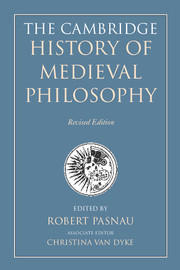Book contents
- Frontmatter
- Contents of Volume 1
- Preface
- List of contributors
- Frontmatter
- Contents of Volume 2
- Introduction
- I Fundamentals
- II Logic and language
- III Natural philosophy
- IV Soul and knowledge
- V Will and desire
- 29 Freedom and determinism
- 30 Intellectualism and voluntarism
- 31 Emotion
- 32 Weakness and grace
- VI Ethics
- VII Political philosophy
- VIII Metaphysics
- IX Theology
- Appendices
- Bibliography of primary sources
- Bibliography of secondary sources
- Index nominum
- Index rerum
- References
31 - Emotion
from V - Will and desire
Published online by Cambridge University Press: 05 August 2014
- Frontmatter
- Contents of Volume 1
- Preface
- List of contributors
- Frontmatter
- Contents of Volume 2
- Introduction
- I Fundamentals
- II Logic and language
- III Natural philosophy
- IV Soul and knowledge
- V Will and desire
- 29 Freedom and determinism
- 30 Intellectualism and voluntarism
- 31 Emotion
- 32 Weakness and grace
- VI Ethics
- VII Political philosophy
- VIII Metaphysics
- IX Theology
- Appendices
- Bibliography of primary sources
- Bibliography of secondary sources
- Index nominum
- Index rerum
- References
Summary
This chapter deals with the basic tenets of ancient philosophical theories of emotions, the reception and transformation of these in the Middle Ages, and some late medieval innovations, concentrating on how emotions were understood as psychological phenomena rather than on an analysis of particular emotions or their role in ethics. Although various theories of the soul influenced the general analysis of emotions, ancient thinkers usually accepted similar descriptions of paradigmatic emotions, such as desire, fear, or anger. This is also typical of later philosophical discussions. In the light of philosophical sources, some emotions look pretty much the same from the days of Plato and Aristotle to our time, while others have changed and still others have become unusual or disappeared (for example, some monastic feelings).
ANCIENT THEORIES
The philosophical analysis of emotions was introduced by Plato and Aristotle, both of whom distinguished between various elements in occurrent emotions as follows. First, the cognitive element is an unpremeditated evaluation that states that something positive or negative is happening, either to the subject or to someone else in a way that is relevant to the subject. Second, the affective element is the pleasant or unpleasant feeling about the content of the evaluation. Third, the dynamic element is the spontaneous behavioral impulse towards a typical action. Fourth, associated with the affective element are bodily reactions which, as distinct from emotional feelings, may occur in other occasions as well.
- Type
- Chapter
- Information
- The Cambridge History of Medieval Philosophy , pp. 428 - 440Publisher: Cambridge University PressPrint publication year: 2014



